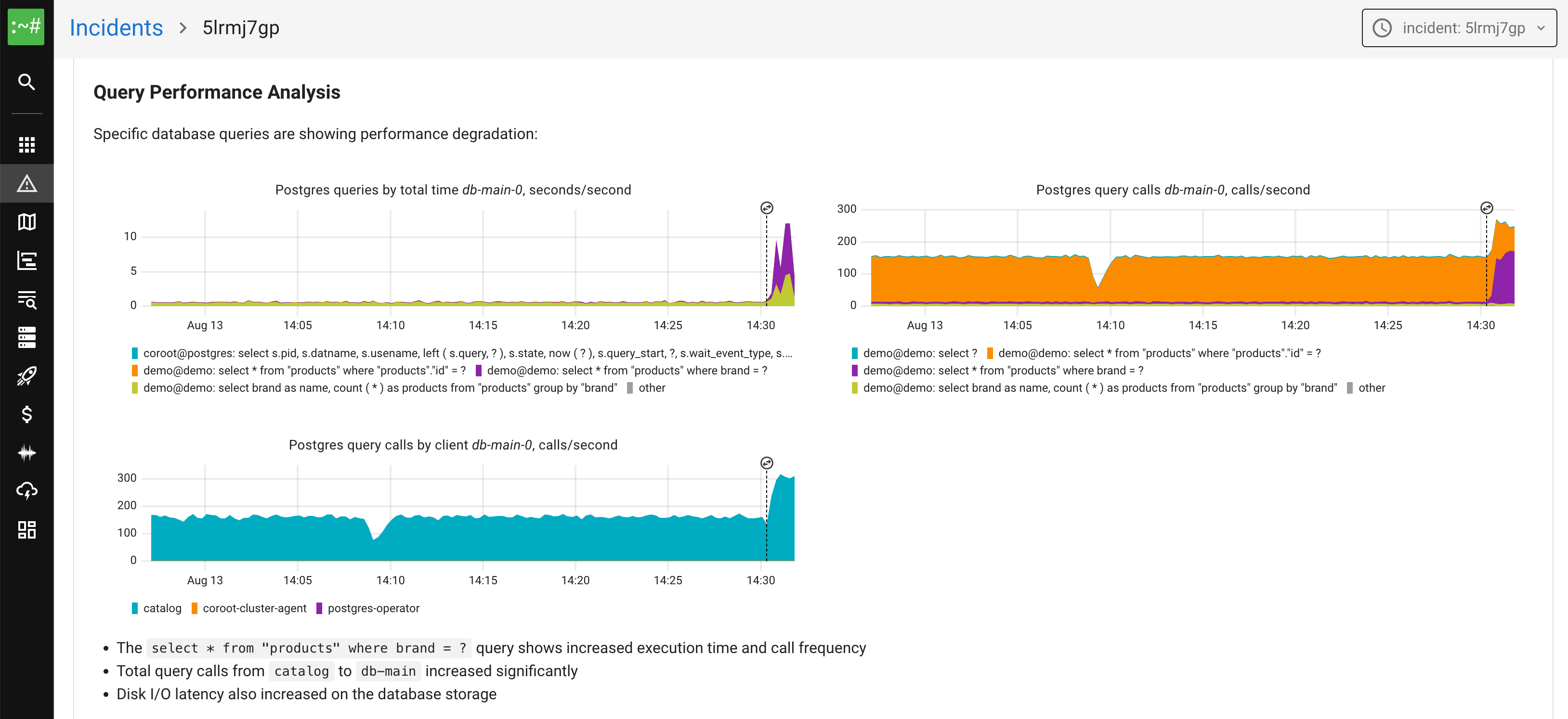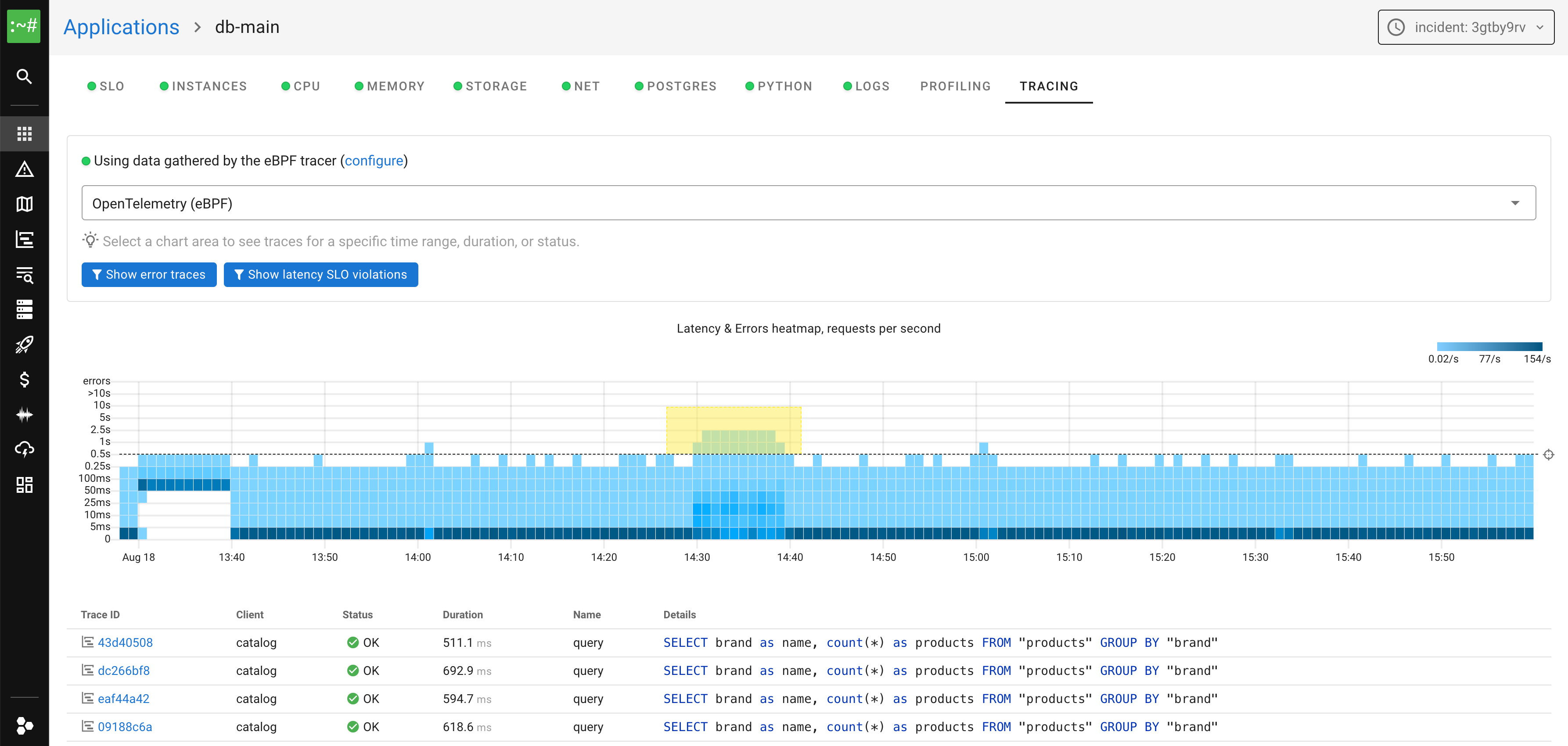PostgreSQL Observability Made Simple
With a quick setup, Coroot captures PostgreSQL traffic and uses system views to explain why queries slow down — from resource spikes to lock contention.
Complete PostgreSQL Visibility
Coroot gives you end-to-end insights into PostgreSQL performance. eBPF captures every query on the wire, while system views explain exactly why the database behaves the way it does.
Full Query Transparency
See every query, its latency, and success rate without adding extensions or overhead.
Root-Cause Clarity
System views pinpoint locks, I/O bottlenecks, and CPU-heavy queries so you know why performance drops.
Works With Encrypted Traffic
Coroot monitors SSL/TLS connections safely by observing traffic before encryption and after decryption.
Per-Application Insights
Understand how each service communicates with PostgreSQL, from connection patterns to query behavior.
Correlation That Matters
Connect network-level latency with internal PostgreSQL metrics for the complete performance story.
Runs Anywhere
Works with any PostgreSQL deployment, from managed cloud services to self-hosted clusters, without extra configuration.
From Database to Application
PostgreSQL doesn't live in isolation — Coroot shows how query performance impacts the services that depend on it.
Application-Aware Monitoring
See which services issue the slowest queries and how their behavior changes over time.
Deployment Correlation
Instantly connect application releases with shifts in query patterns and database load.
End-to-End Performance
Trace latency from the application layer down to PostgreSQL to understand the full user impact.
Deep insights into database performance + AI
See how applications talk to PostgreSQL and why queries slow down. Every connection, every query, every bottleneck - visible with minimal setup.
Query Performance Analysis
Automatically collect metrics from pg_stat_statements and pg_stat_activity to identify your most resource-intensive queries. See CPU usage, I/O patterns, and execution statistics correlated with wire protocol data.

Query Tracing & Performance
eBPF captures every PostgreSQL query with detailed tracing, showing latency heatmaps, error rates, and individual query performance. See exact SQL statements and execution times without any database instrumentation.

PostgreSQL Health & Metrics
Monitor PostgreSQL availability, query latency, replication lag, and connection usage with real-time charts. Get instant visibility into database health.

Works With All PostgreSQL Deployments
From Kubernetes clusters to managed cloud databases - monitor PostgreSQL anywhere with consistent visibility
Kubernetes
PostgreSQL running in containers with automatic pod and service discovery
Cloud
AWS RDS, Aurora, Cloud SQL with complete performance monitoring
Self-Hosted
On-premise and custom PostgreSQL deployments with full observability
Why PostgreSQL Monitoring Is Usually a Pain
Traditional monitoring tools only see one side of the story - either application metrics or database internals, but never how they connect.
How Coroot Solves This
Coroot's dual-layer approach combines wire protocol capture with PostgreSQL system views for complete visibility.
Ready to Monitor Your PostgreSQL Databases?
Start monitoring PostgreSQL with zero configuration. Works with any deployment - from Kubernetes to cloud managed databases.
✓ Zero configuration ✓ SSL/TLS monitoring ✓ Open source agent ✓ Prometheus compatible
